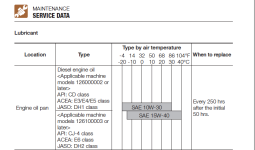Cat_Driver
Veteran Member
- Joined
- Jan 15, 2008
- Messages
- 2,359
- Location
- Coachella Ca.
- Tractor
- 2016 Kubota 4060, 2017 Tackeuchi excavator TB260
Normally after any diesel oil change the new fresh oil I put in is instantly BLACK even when I just check the oil
for the proper amount while refilling the engine.
Last week I changed the oil min, my Excavator, after seeing the very thin viscosity oil the dealer had in the unit when I purchased it used. I replaced their oil with my favorite 15/40 oil mostly because of the temps here( been 117 - 122 all weel). Anyway, after running the machine for 10 hours in brutal conditions, I checked the oil and to my surprise, the oil was about as clean as when I put it it in. I did the old rub it between my finger "test" for viscosity and it was nice and thick unlike what I replaced which was as thin as hydraulic fluid.
Like I said that's a first for me not seeing JET BLACK engine oil in a diesel. I don't know is it the Yanmar technology in the TB260, because my Mercedes Sprinter ALWAYS had black as coal looking oil even after a change. Same with Ford GM, Hino, etc.

for the proper amount while refilling the engine.
Last week I changed the oil min, my Excavator, after seeing the very thin viscosity oil the dealer had in the unit when I purchased it used. I replaced their oil with my favorite 15/40 oil mostly because of the temps here( been 117 - 122 all weel). Anyway, after running the machine for 10 hours in brutal conditions, I checked the oil and to my surprise, the oil was about as clean as when I put it it in. I did the old rub it between my finger "test" for viscosity and it was nice and thick unlike what I replaced which was as thin as hydraulic fluid.
Like I said that's a first for me not seeing JET BLACK engine oil in a diesel. I don't know is it the Yanmar technology in the TB260, because my Mercedes Sprinter ALWAYS had black as coal looking oil even after a change. Same with Ford GM, Hino, etc.



